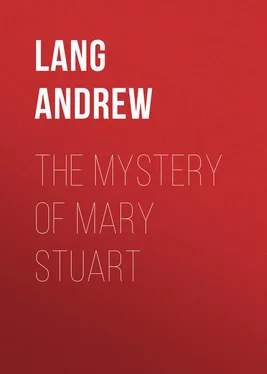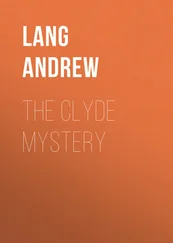Andrew Lang - The Mystery of Mary Stuart
Здесь есть возможность читать онлайн «Andrew Lang - The Mystery of Mary Stuart» — ознакомительный отрывок электронной книги совершенно бесплатно, а после прочтения отрывка купить полную версию. В некоторых случаях можно слушать аудио, скачать через торрент в формате fb2 и присутствует краткое содержание. Жанр: foreign_antique, foreign_prose, на английском языке. Описание произведения, (предисловие) а так же отзывы посетителей доступны на портале библиотеки ЛибКат.
- Название:The Mystery of Mary Stuart
- Автор:
- Жанр:
- Год:неизвестен
- ISBN:нет данных
- Рейтинг книги:4 / 5. Голосов: 1
-
Избранное:Добавить в избранное
- Отзывы:
-
Ваша оценка:
- 80
- 1
- 2
- 3
- 4
- 5
The Mystery of Mary Stuart: краткое содержание, описание и аннотация
Предлагаем к чтению аннотацию, описание, краткое содержание или предисловие (зависит от того, что написал сам автор книги «The Mystery of Mary Stuart»). Если вы не нашли необходимую информацию о книге — напишите в комментариях, мы постараемся отыскать её.
The Mystery of Mary Stuart — читать онлайн ознакомительный отрывок
Ниже представлен текст книги, разбитый по страницам. Система сохранения места последней прочитанной страницы, позволяет с удобством читать онлайн бесплатно книгу «The Mystery of Mary Stuart», без необходимости каждый раз заново искать на чём Вы остановились. Поставьте закладку, и сможете в любой момент перейти на страницу, на которой закончили чтение.
Интервал:
Закладка:
Of Bothwell, the third protagonist in the tragedy of Three, we have no portrait, and but discrepant descriptions. They who saw his body, not yet wholly decayed, in Denmark, reported that he must have been ‘an ugly Scot,’ with red hair, mixed with grey before he died. Much such another was the truculent Morton. [8] M. Jusserand has recently seen the corpse of Bothwell. Appendix A.
Born in 1536 or 1537, Bothwell was in the flower of his age, about thirty, when Darnley perished. He was certainly not old enough to have been Mary’s father, as Sir John Skelton declared, for he was not six years her senior. His father died in 1556, and Bothwell came young into the Hepburn inheritance of impoverished estates, high offices, and wild reckless blood. According to Buchanan, Bothwell, in early youth, was brought up at the house of his great-uncle, Patrick Hepburn, Bishop of Moray, who certainly was a man of profligate life. It is highly probable that Bothwell was educated in France.
‘Blockish’ or not, Bothwell had the taste of a bibliophile. One of two books from his library, well bound, and tooled with his name and arms, is in the collection of the University of Edinburgh. Another was in the Gibson Craig Library. The works are a tract of Valturin, on Military Discipline (Paris, 1555, folio), and French translations of martial treatises attributed to Vegetius, Sextus Julius, and Ælian, with a collection of anecdotes of warlike affairs (Paris, 1556, folio). The possession of books like these, in such excellent condition, is no proof of doltishness. Moreover, Bothwell appears to have read his ‘CXX Histoires concernans le faite guerre.’ The evidence comes to us from a source which discredits the virulent rhetoric of Buchanan’s ally.
It was the cue of Mary’s foes to represent Bothwell as an ungainly, stupid, cowardly, vicious monster: because, he being such a man, what a wretch must the Queen be who could love him! ‘Which love, whoever saw not, and yet hath seen him, will perhaps think it incredible… But yet here there want no causes, for there was in them both a likeness, if not of beauty or outward things, nor of virtues, yet of most extream vices.’ [9] Actio , probably by Dr. Wilson, appended to Buchanan’s Detection .
Buchanan had often celebrated, down to December 1566, Mary’s extreme virtues. To be sure his poem, recited shortly before Darnley’s death, may have been written almost as early as James’s birth, in readiness for the feast at his baptism, and before Mary’s intrigue with Bothwell could have begun. In any case, to prove Bothwell’s cowardice, some ally of Buchanan’s cites his behaviour at Carberry Hill, where he wishes us to believe that Bothwell showed the white feather of Mary’s ‘pretty venereous pidgeon.’ As a witness, he cites du Croc, the French Ambassador, an aged and sagacious man. To du Croc he has appealed, to du Croc he shall go. That Ambassador writes: ‘He’ (Bothwell) ‘told me that there must be no more parley, for he saw that the enemy was approaching, and had already crossed the burn. He said that, if I wished to resemble the man who tried to arrange a treaty between the forces of Scipio and Hannibal, their armies being ready to join in battle, like the two now before us, and who failed, and, wishing to remain neutral, took a point of vantage, and beheld the best sport that ever he saw in his life, why then I should act like that man, and would greatly enjoy the spectacle of a good fight.’ Bothwell’s memory was inaccurate, or du Croc has misreported his anecdote, but he was certainly both cool and classical on an exciting occasion.
Du Croc declined the invitation; he was not present when Bothwell refused to fight a champion of the Lords, but he goes on: ‘I am obliged to say that I saw a great leader, speaking with great confidence, and leading his forces boldly, gaily, and skilfully… I admired him, for he saw that his foes were resolute, he could not be sure of the loyalty of half of his own men, and yet he was quite unmoved.’ [10] Teulet, ii. p. 176. Edinburgh, June 17, 1567.
Bothwell, then, was neither dolt, lout, nor coward, as Buchanan’s ally wishes us to believe, for the purpose of disparaging the taste of a Queen, Buchanan’s pupil, whose praises he had so often sung.
In an age when many gentlemen and ladies could not sign their names, Bothwell wrote, and wrote French, in a firm, yet delicate Italic hand, of singular grace and clearness. [11] See a facsimile in Teulet, ii. 256.
His enemies accused him of studying none but books of Art Magic in his youth, and he may have shared the taste of the great contemporary mathematician, Napier of Merchistoun, the inventor of Logarithms. Both Mary’s friends and enemies, including the hostile Lords in their proclamations, averred that Bothwell had won her favour by unlawful means, philtres, witchcraft, or what we call Hypnotism. Such beliefs were universal: Ruthven, in his account of Riccio’s murder, tells us that he gave Mary a ring, as an antidote to poison (not that he believed in it), and that both she and Moray took him for a sorcerer. On a charge of sorcery did Moray later burn the Lyon Herald, Sir William Stewart, probably basing the accusation on a letter in which Sir William confessed to having consulted a prophet, perhaps Napier of Merchistoun, the father, not the inventor of Logarithms. [12] Appendix B. ‘Burning of the Lyon King at Arms.’
Quite possibly Bothwell may really have studied the Black Art in Cornelius Agrippa and similar authors. In any case it is plain that, as regards culture, the author of Les Affaires du Conte de Boduel , the man familiar with the Court of France, where he had held command in the Scots Guards, and had probably known Ronsard and Brantôme, must have been a rara avis of culture among the nobles at Holyrood. So far, then, Mary’s love for him, if love she entertained, was the reverse of ‘incredible.’ It did not need to be explained by a common possession of ‘extreme vices.’ The author, as usual, overstates his case, and proves too much: Lesley admits that Bothwell was handsome, an opinion emphatically contradicted by Brantôme.
Bothwell had the charm of recklessness to an unexampled degree. He was fierce, passionate, unyielding, strong, and, in the darkest of Mary’s days, had been loyal. He had won for her what Knollys tells us that she most prized, victory. A greater contrast could not be to the false fleeting Darnley, the bully with ‘a heart of wax.’ In him Mary had more than enough of bloom and youthful graces: she could master him, and she longed for a master. If then she loved Bothwell, her love, however wicked, was not unnatural or incredible. He had been loved by many women, and had ruined all of them.
Among the other persons of the play, Moray is foremost, Mary’s natural brother, the son of her whom James V. loved best, and, it was said, still dreamed of while wooing a bride in France. Moray is an enigma. History sees him, as in Lethington’s phrase, ‘looking through his fingers,’ looking thus at Riccio’s and at Darnley’s murders. These fingers hide the face. He was undeniably a sound Protestant: only for a brief while, in Mary’s early reign, was he sundered from Knox. In war he was, as he aimed at being, ‘a Captain in Israel,’ cool, courageous, and skilled. That he was extremely acquisitive is certain. Born a royal bastard, and trained for the Church, he clung as ‘Commendator’ to the Church’s property which he held as a layman. His enormous possessions in land, collected partly by means that sailed close to the wind, partly from the grants of Mary, excited the rash words of Darnley, that they were ‘too large.’
An early incident in Moray’s life seems characteristic. The battle of Pinkie was fought in 1547, when he was sixteen. Among the slain was the Master of Buchan, the heir-apparent of the Earl of Buchan. He left a child, Christian Stewart, who was now heiress of the earldom. In January 1550, young Lord James Stewart, though Prior of St. Andrews, contracted himself in marriage with the little girl. The old earl was extravagant, perhaps more or less insane, and was deep in debt. His lands were mortgaged. In 1556 the Lord James bought and secured from the Regent, Mary of Guise, the right of redemption. In 1562, being all powerful now with Mary, he secured a grant of the ‘ward, non-entries, and reliefs of the whole estates of the earldom of Buchan.’ Now, by the proclamation made, as usual, before Pinkie fight, all these were left by the Crown, free, to the heirs of such as might fall in the battle. Therefore they ought to have appertained to Christian Stewart, whom Moray had not married, her grandfather being dead. Moray secured everything to himself, by charters from the Crown. The unlucky Christian went on living at Loch Leven, with Moray’s mother, Lady Douglas. In February 1562 Moray wedded Agnes Keith, daughter of the Earl Marischal. His brother, apparently without his knowledge, then married Christian. Moray wrote a letter to his own mother complaining of this marriage as an act of treachery. The Old Man peeps out through the godly and respectful style of this epistle. Moray speaks of Christian as ‘that innocent;’ perhaps she was not remarkable for intellect. He adds that whoever tries to take from him the lady’s estates will have to pass over ‘his belly.’ And, indeed, he retained the possessions. The whole transaction does seem to savour of worldliness, to be regretted in so good a man.
Читать дальшеИнтервал:
Закладка:
Похожие книги на «The Mystery of Mary Stuart»
Представляем Вашему вниманию похожие книги на «The Mystery of Mary Stuart» списком для выбора. Мы отобрали схожую по названию и смыслу литературу в надежде предоставить читателям больше вариантов отыскать новые, интересные, ещё непрочитанные произведения.
Обсуждение, отзывы о книге «The Mystery of Mary Stuart» и просто собственные мнения читателей. Оставьте ваши комментарии, напишите, что Вы думаете о произведении, его смысле или главных героях. Укажите что конкретно понравилось, а что нет, и почему Вы так считаете.












